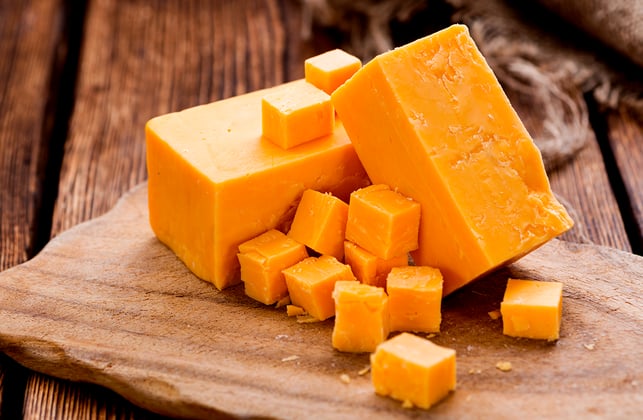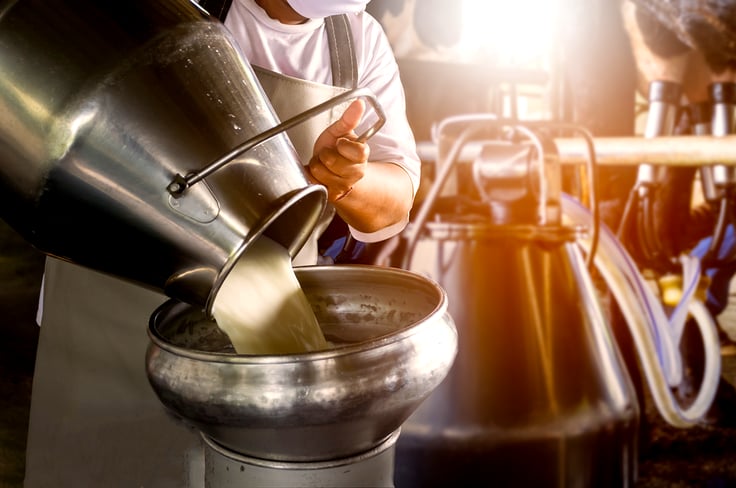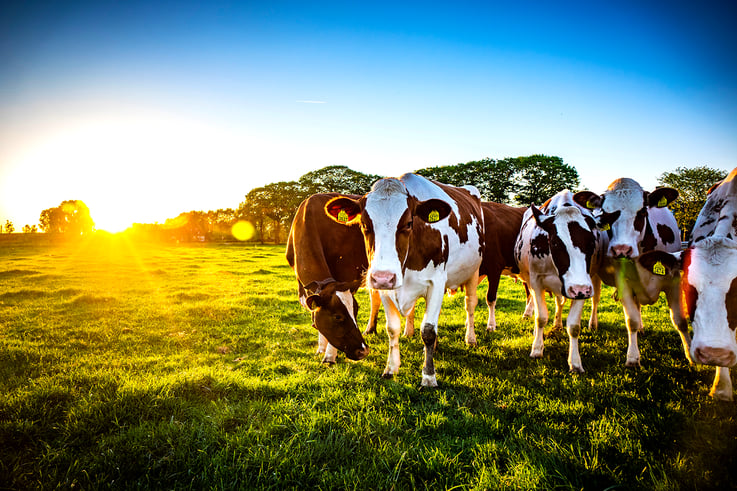✓ No prerequisites
✓ 100% online for maximum flexibility
✓ Full student experience in English and Spanish
✓ Created by industry experts and designed to give you needed skills
The overall economic impact of the U.S. dairy products industry

The purpose of the Online Dairy Foods Manufacturing Certificate is to provide the skills and expertise you need to be in demand and command a higher salary.
This program was specifically designed by working closely with the dairy industry to help you gain the essential framework for career growth and professional development.
The knowledge gained from the dairy certificate tracks and modules will help you with the essentials of:
The modules and certificates are designed to train and upskill:
Because of the close connection to industry, this program is also helpful if you're in the regulatory space or in sales on the supplier side.
The full certificates (Essentials and Advanced Certificates in Dairy Manufacturing) provide an in-depth exploration of core topics related to dairy manufacturing. They are ideal for new hires with limited or no prior dairy or food industry education, as well as those looking to brush up on foundational knowledge.
Micro Certificates and individual modules focus on specific specialties in dairy manufacturing, and are ideal for existing personnel seeking career advancement, supervisors, and others looking to deepen their dairy-related technical and scientific knowledge.
Each on-demand module is approximately 1 – 2 hours in length.
Bulk enrollments are also easily accepted.
Oregon State University's dairy foods program has been teaching students for over 100 years.
Now, in terms of its programs, research, and outreach, it's considered one of the largest educational dairy programs in the world (estimated to be the fifth biggest in the U.S.).
And with 100 years of history, OSU's dairy program has established connections and partnerships with prominent companies in dairy manufacturing.
In fact, OSU alumni hold leadership positions in dairy companies nationally.

As a result, OSU's dairy program has established a great feedback loop within the industry and stakeholders, and this helps ensure the program continues to be relevant and top-notch and this is one of the most respected certifications in the dairy industry.
The Essential Dairy Foods Manufacturing Certificate consists
of 12 essential modules plus 1 elective in a specialized focus.
Learning Outcomes
By the end of the program, you will:


The Advanced Certificate in Dairy Foods Manufacturing builds on the Essential Certificate and includes all 23 modules. If you've taken any modules previously, they will apply towards the full certificate.
Learning Outcomes
By the end of the program, you will:

"One of the challenges we consistently hear about from cheesemakers of all sizes is the difficulty finding and engaging qualified and enthusiastic employees.
OSU’s Dairy Manufacturing PACE program provides an efficient and customizable platform for onboarding new staff, training up existing employees to handle additional responsibilities, or attracting people with transferable skills to the cheese industry.We are excited to see how this potentially game-changing new program will take our industry to the next level."
~ Katie Bray, Executive Director Oregon Cheese Guild

We offer short ("micro") certificates for the following specialty areas. These may be completed independently or in conjunction with an Essential or Advanced Certificate program.
Qualified Individual Micro Certificate. Modules 8 & 10. GMPs and Food Safety Systems and Culture. These modules are needed by all plant personnel and can be repeated annually to meet FSMA refresher training requirements for Food Hygiene and Food Safety. The certificate would be perfect for new hires and annual refresher training for all plant workers.
MODULE 1: Intro to Dairy Production and Processing Ind.
Module 1 is an overview of our U.S. dairy industry from farm to table, and to give context to where the dairy processing sector fits in the total dairy supply chain.
Click to learn more.
MODULE 2: Dairy Chemistry and Physics
Module 2 is important to understand the principles and aims of cleaning and sanitation in the production of dairy products.
Click to learn more.
MODULE 3: Dairy Microbiology
Module 3 is intended to be an overview of fundamentals of dairy microbiology – including microorganisms (bacteria, fungi, viruses) and microbial growth factors and characteristics.
MODULE 4: Fluid Milk I
In module 4, we will be looking at the unit operations involved in fluid milk processing and dairy products manufacture.
MODULE 5: Fluid Milk II
In module 5, we examine higher heat, thermal operations that go beyond normal pasteurization conditions and are used in processing of milk and other dairy products.
MODULE 6: Common Dairy Equipment
In module 6, we will be looking at the equipment used in dairy processing.
MODULE 7: Packaging
In module 7, we will be looking at the basics of food packaging with special focus on dairy products.
MODULE 8: Current Good Manufacturing Practices
Module 8 is focused on good manufacturing practices we employ every day in our processing plants.
MODULE 9: Cleaning and Sanitation
In module 9, we will be looking at the importance and challenges of cleaning and sanitation of equipment and processes in dairy manufacturing.
MODULE 10: Food Safety Systems and Culture
In module 10, we will look at food safety systems through background, history and definitions.
MODULE 11: Regulations and Standards for Dairy
In module 11, we will look at the regulatory environment for the dairy industry.
MODULE 12: Sustainable Dairy Processing
Module 12 focuses on environmental sustainability (e.g., carbon foot print, greenhouse gases, etc.) and sustainable dairy processing, impact of dairy on the emissions as well as opportunities to reduce it.
MODULE 13: Membrane Filtration Process
In module 13, we will look at the membrane separation and concentration technologies.
MODULE 14: Concentration, Evaporation, Drying
In module 14, we will be looking at concentration, evaporation, drying technologies.
MODULE 15: Supply Chain Management for Non-Dairy Ingredients
In module 15, we will look at a broad array of non-dairy ingredients that, when added to milk, help us make delicious and safe dairy products like yogurt, ice cream, cheese and more!
MODULE 16: Quality Systems and Finished Product Quality
In module 16, we will look at a Quality System including sampling, testing, and inspection of our ingredients, in-process products, and finished products.
MODULE 17: Basic Cheese Making
In module 17, we will look at the definition of cheese, classification cheese, cheese production, utilization of cheese whey as well as the quality and safety aspects in cheese.
MODULE 18: Specialty Cheese Making
Module 18 focuses on the broad categories of specialty cheeses.
MODULE 19: Grade A Cultured Dairy Products
In module 19, we will look at the manufacturing of Grade A cultured dairy products.
MODULE 20: Dried Dairy Products I (Milk and Whey Powders)
In module 20, we will look at the two dried products categories: milk powder and whey powder.
MODULE 21: Dried Dairy Products II (WPC, WPI, Lactoferrin, Casein)
In module 21, we look at dried product categories: powders of whey protein concentrate, whey protein isolate, lactoferrin, and casein.
MODULE 22: Ice Cream
In module 22, we will look at the definition and types of ice cream, the manufacture of ice cream, and its structure.
MODULE 23: Cream and Butter
In module 23, we will be looking at the definition of cream and butter as well as the standards for these products.
